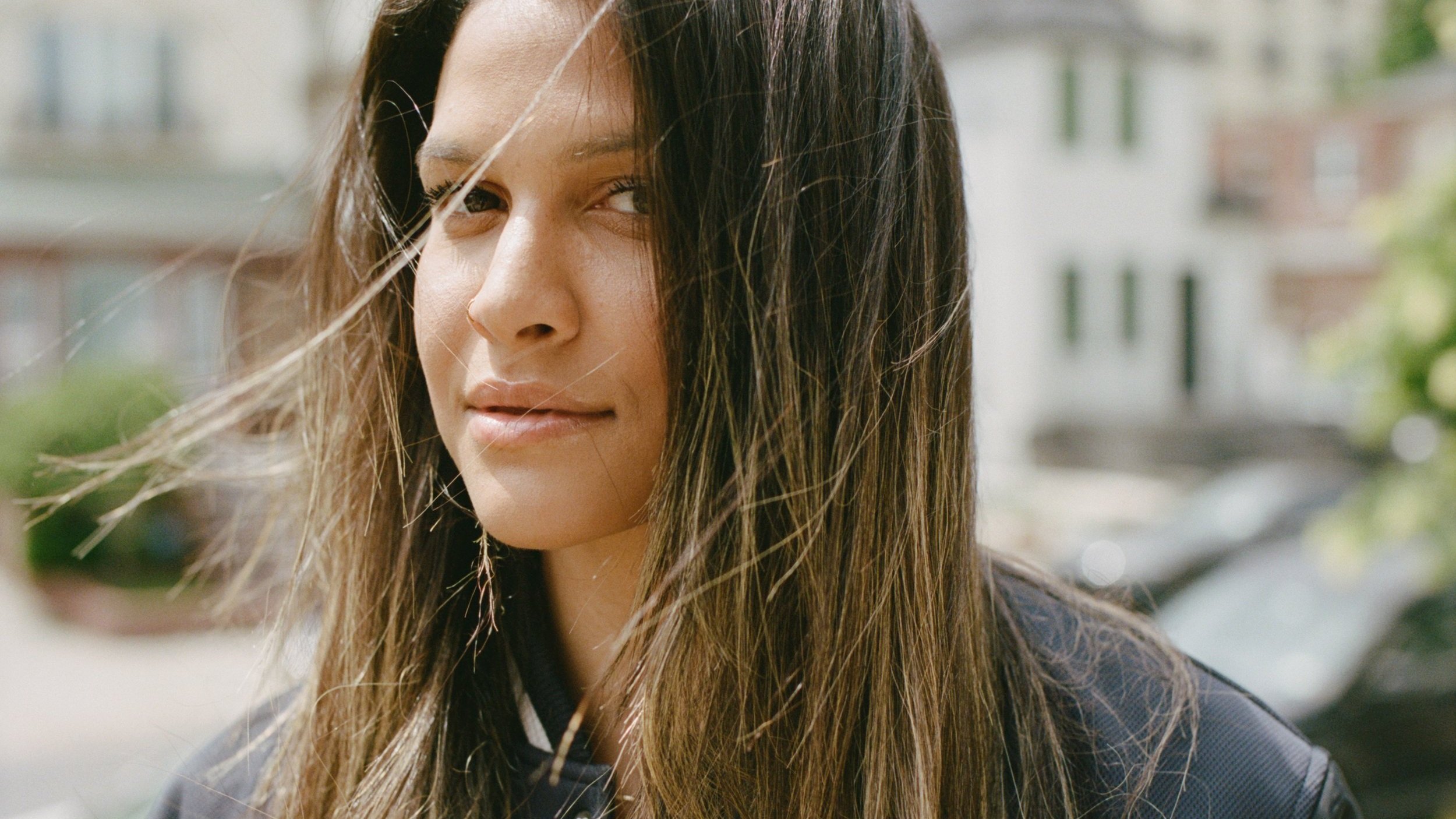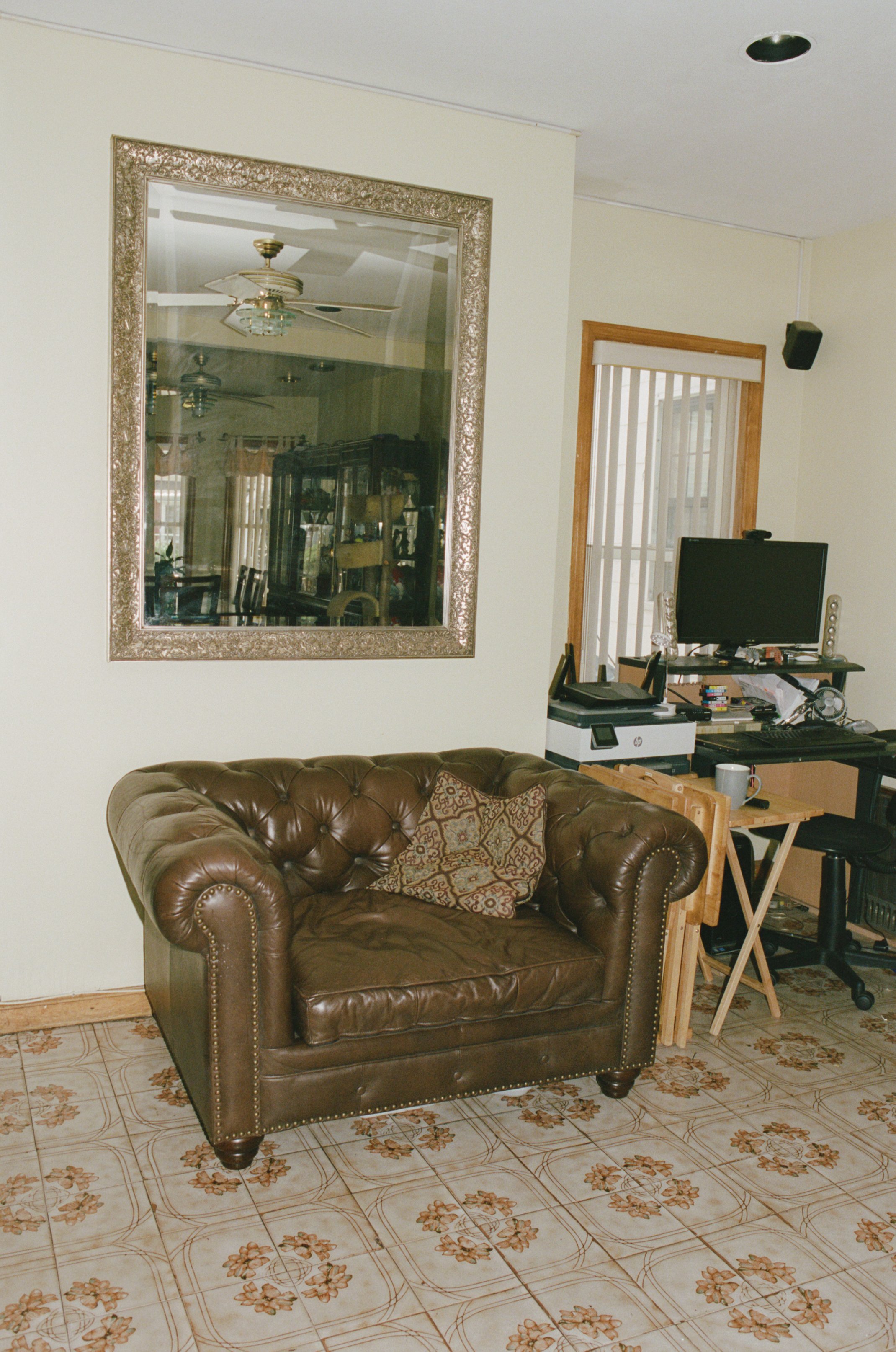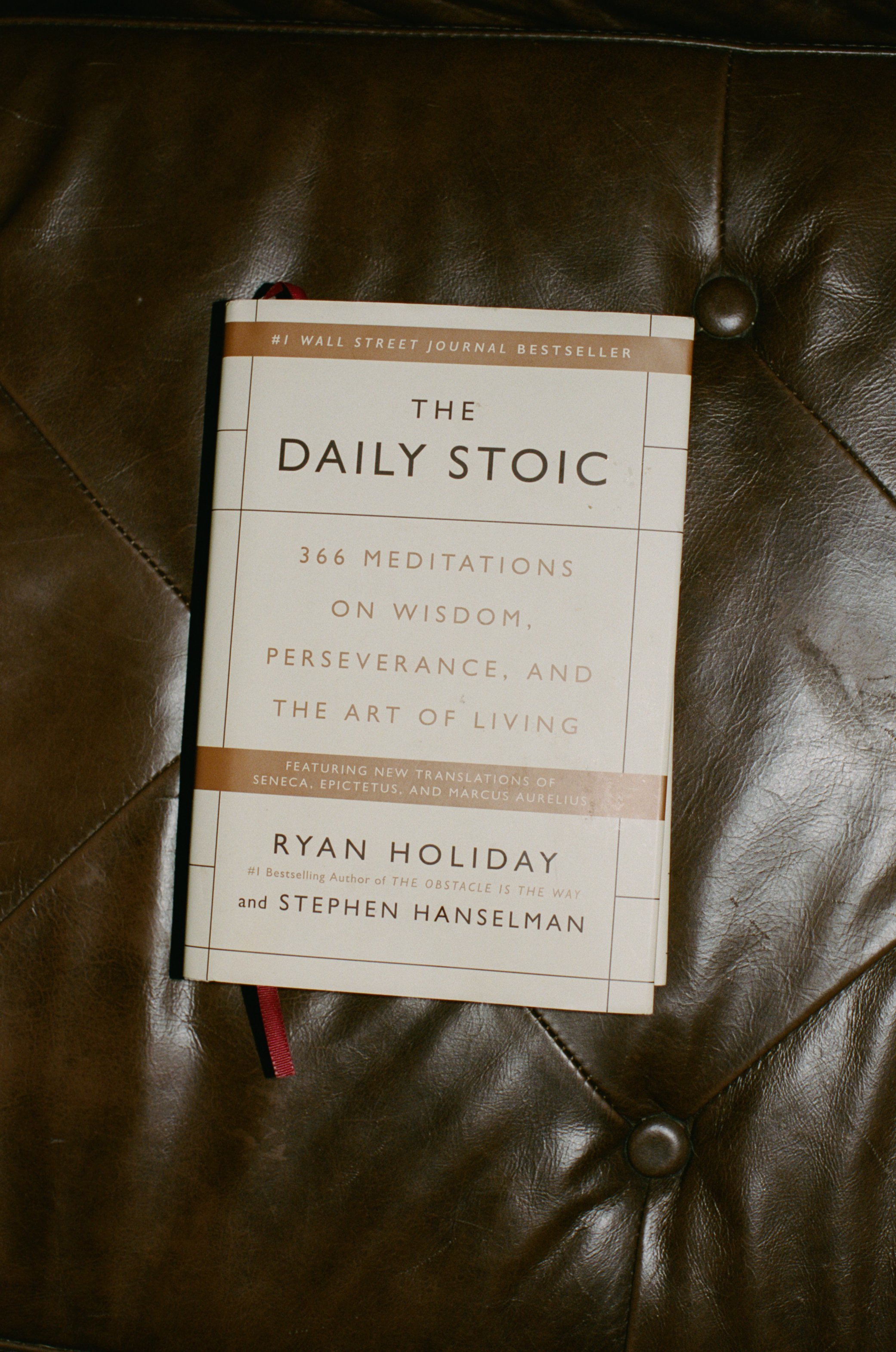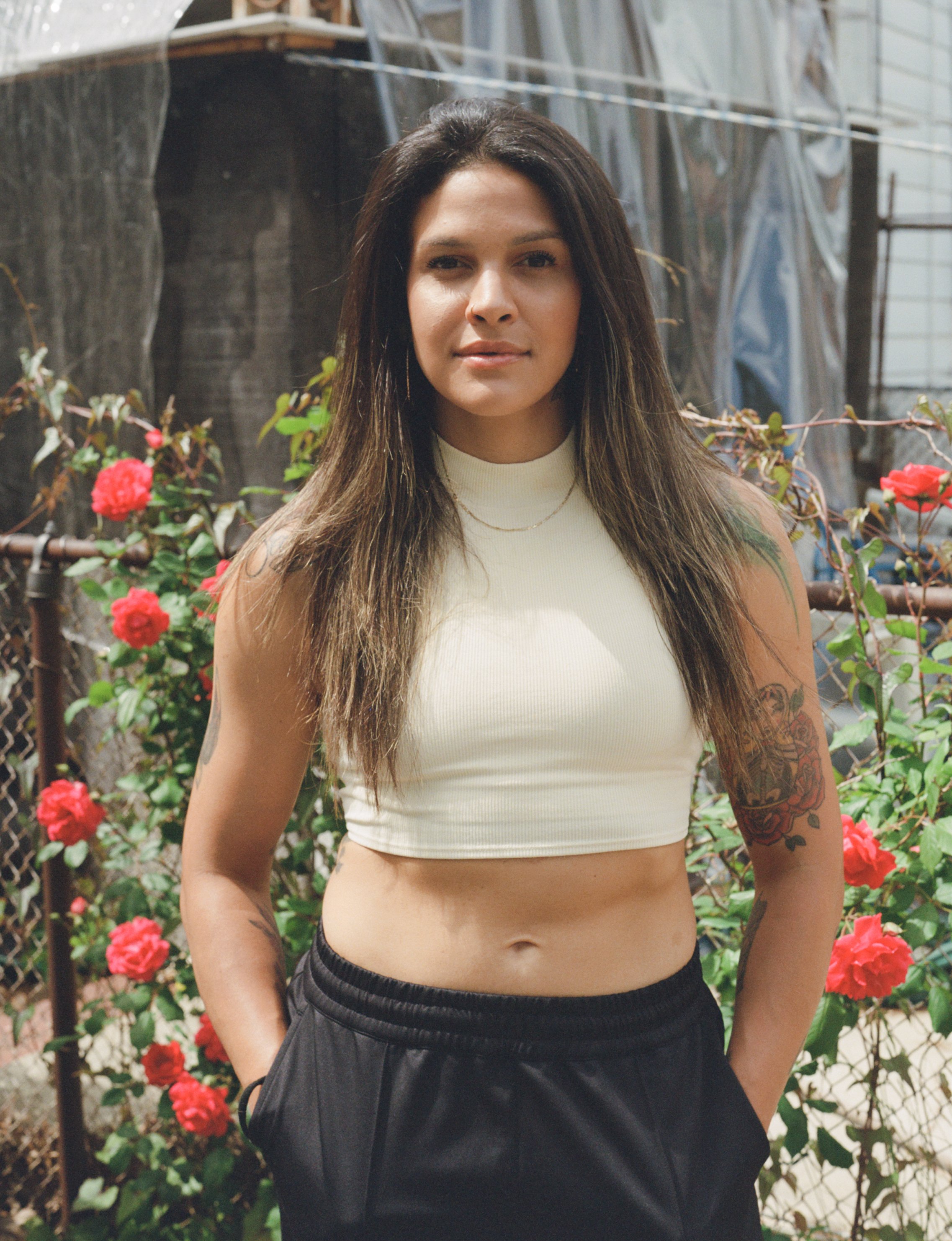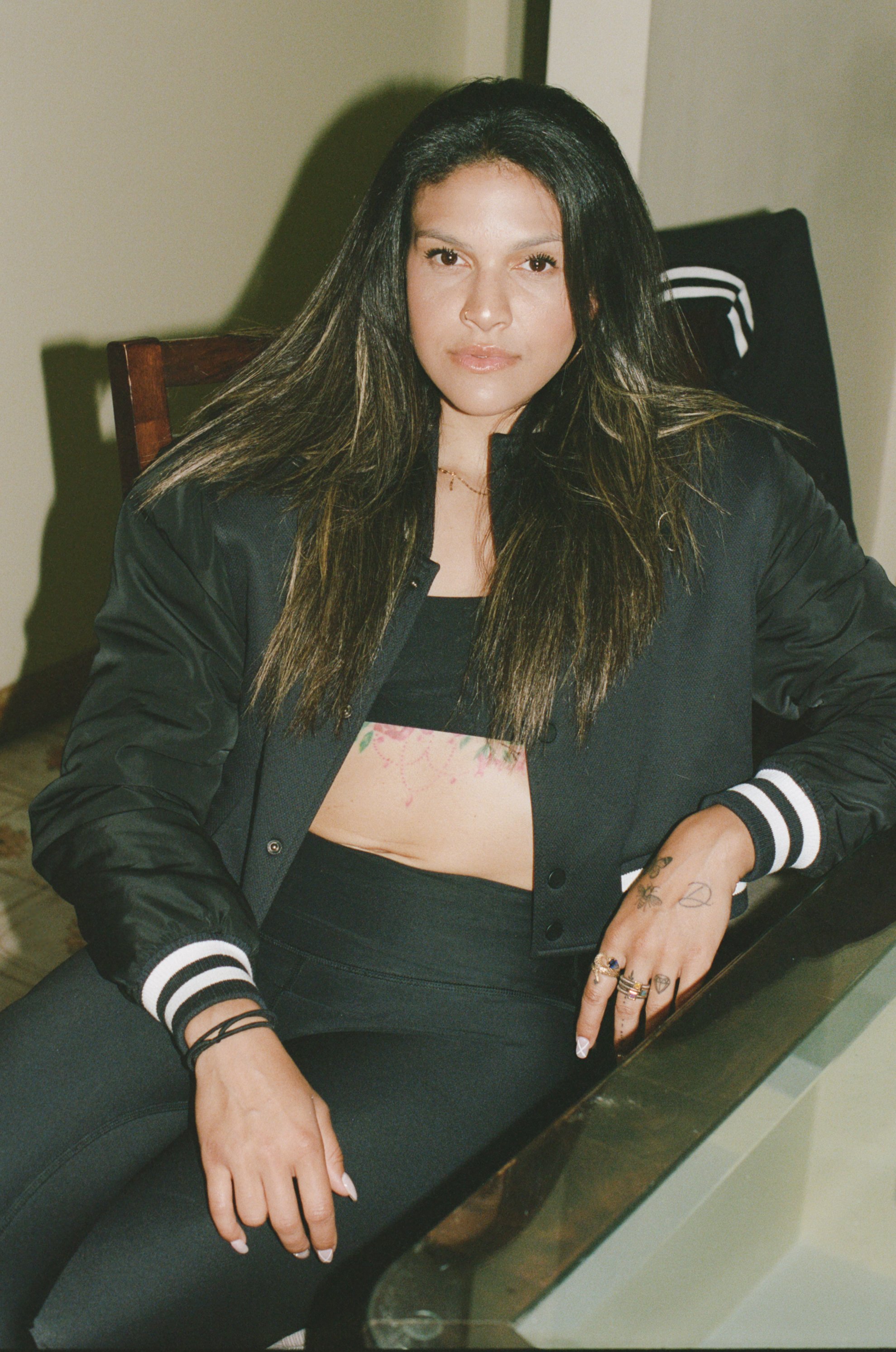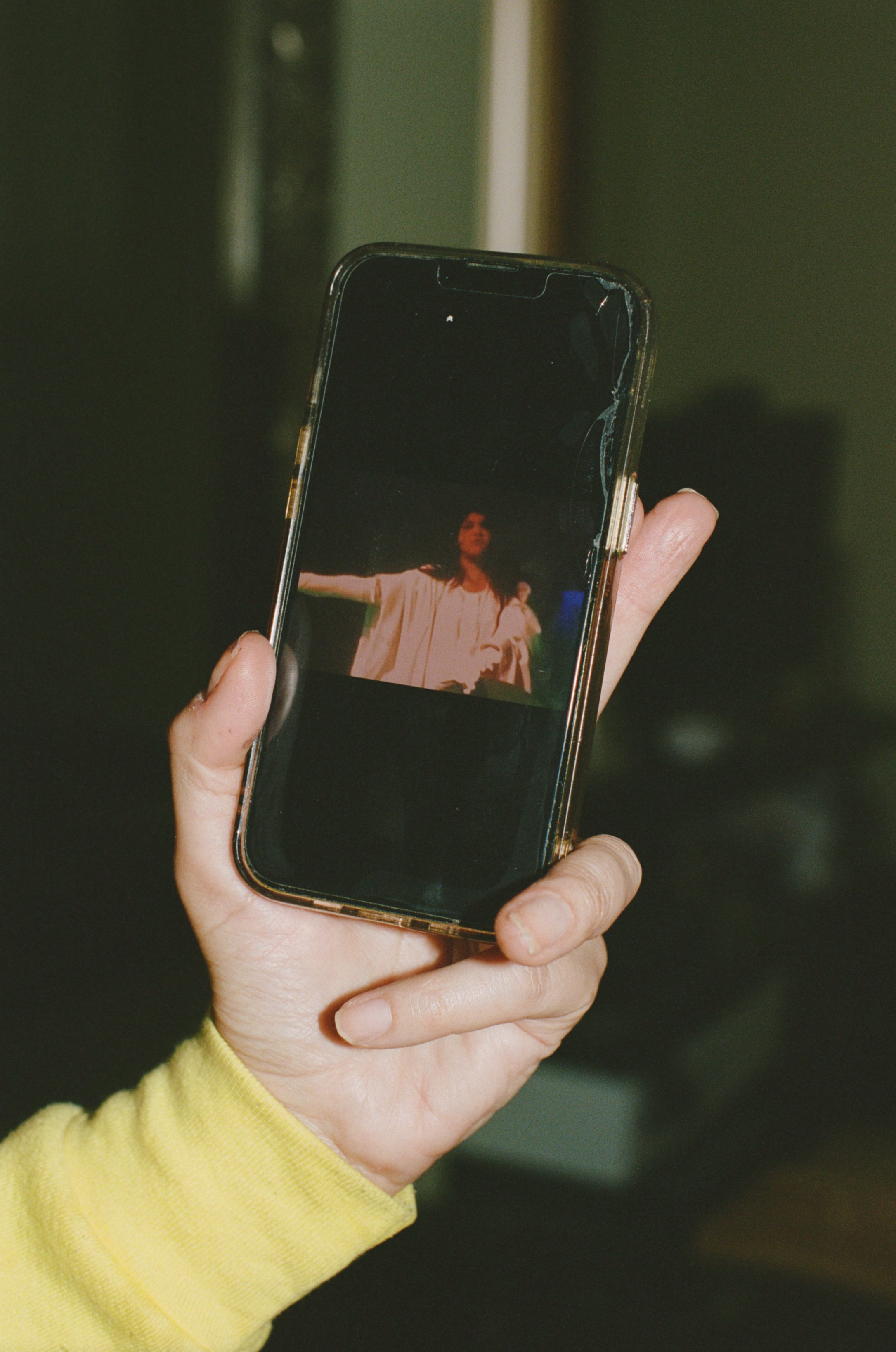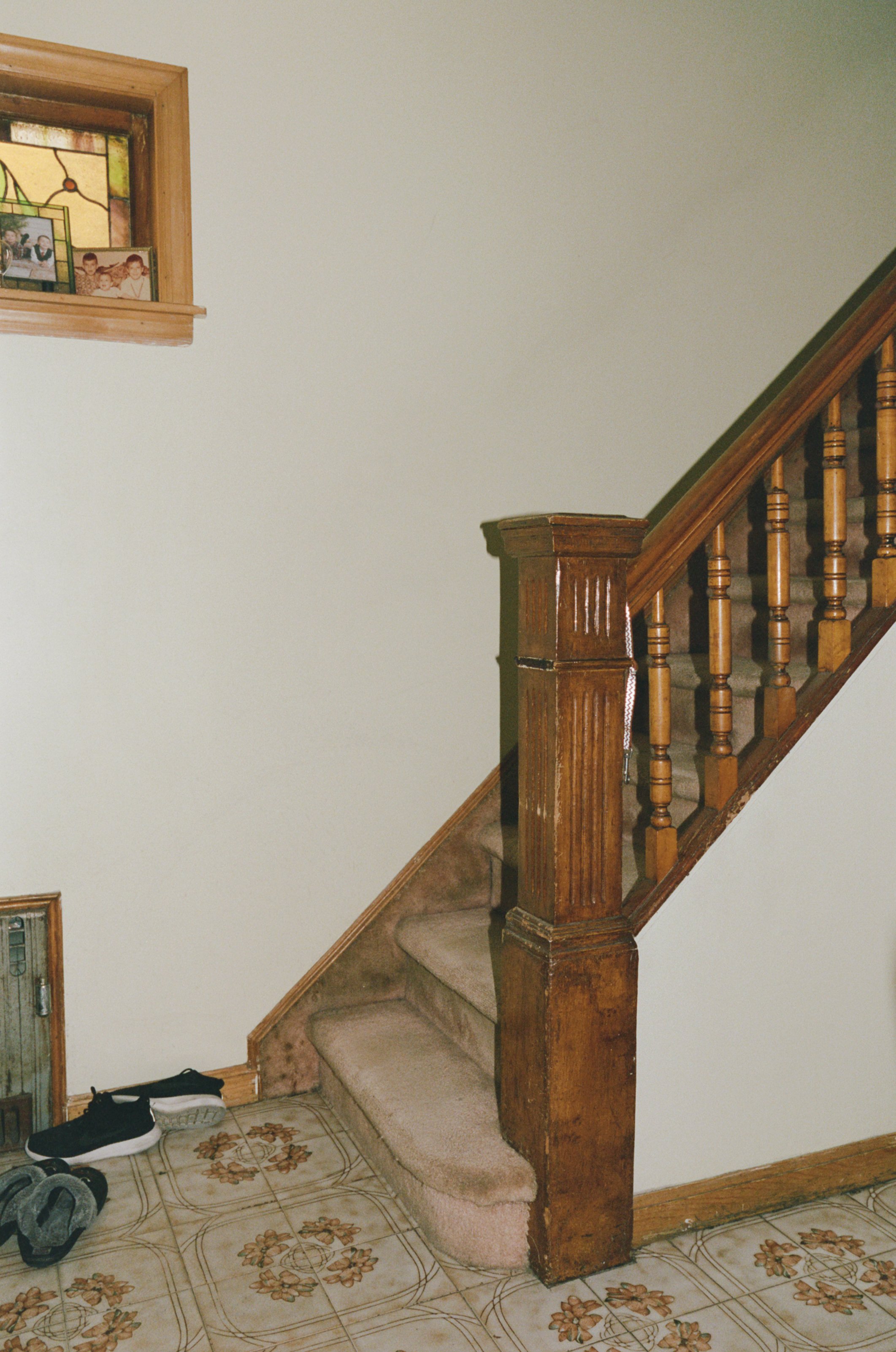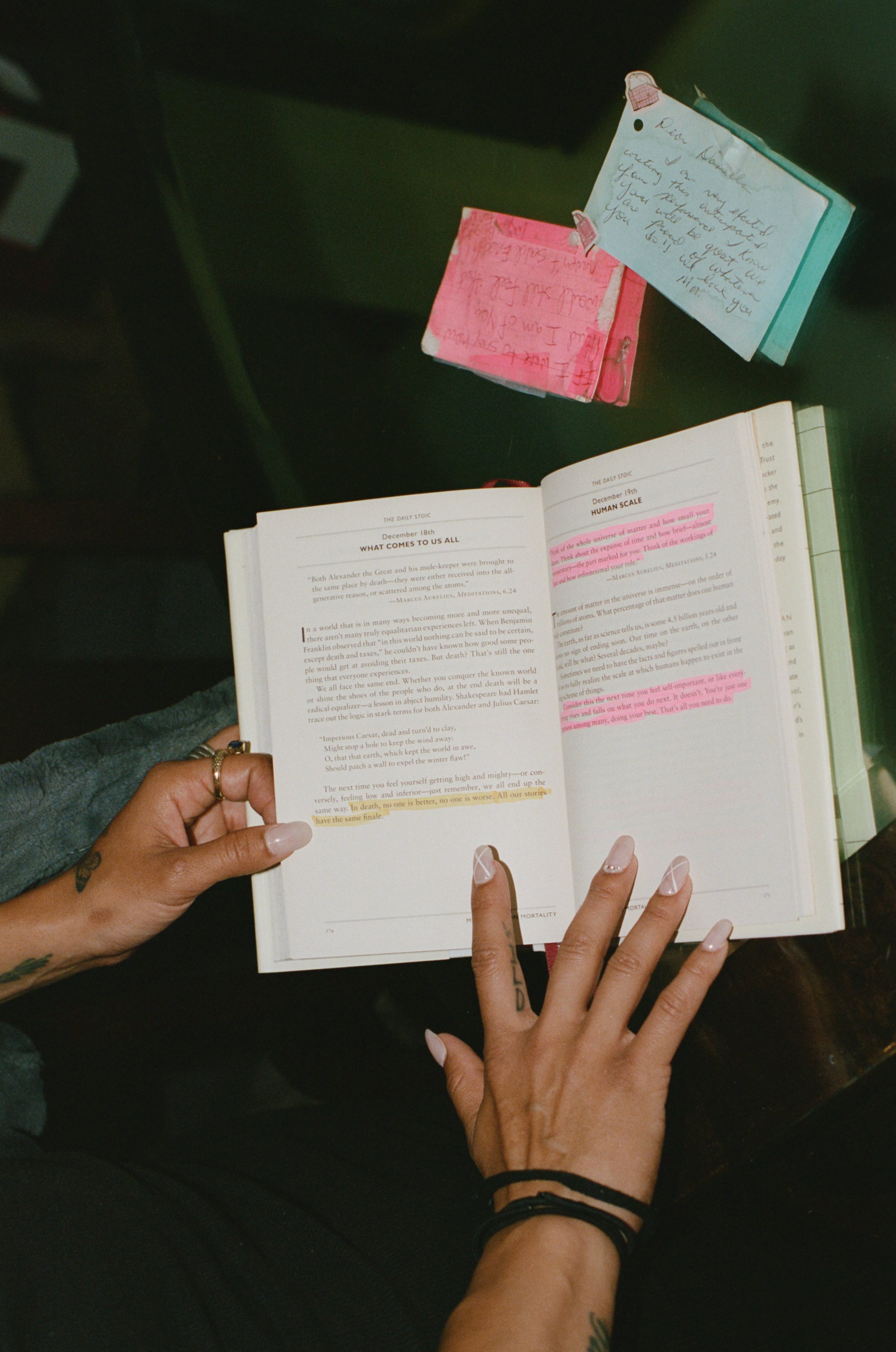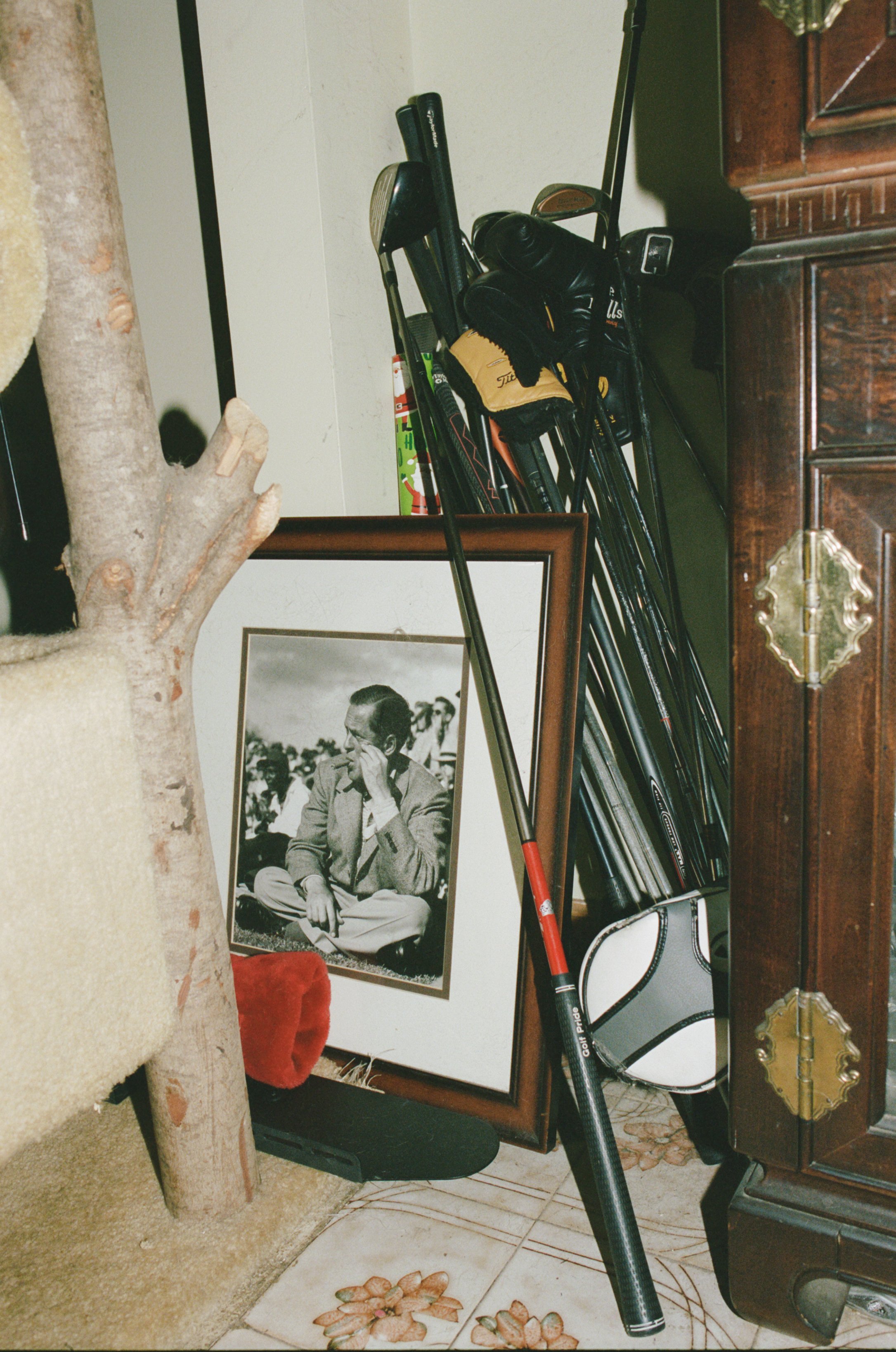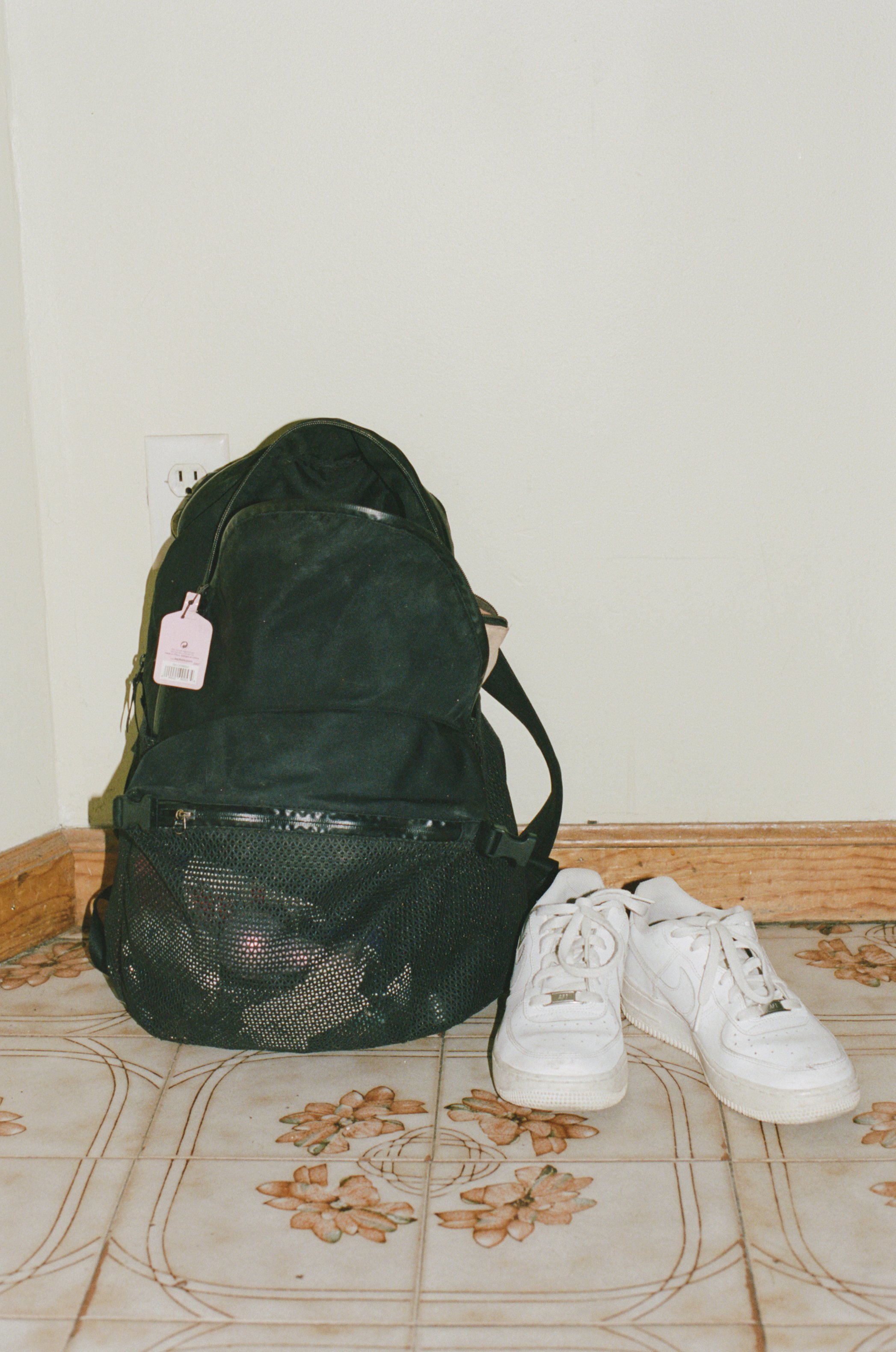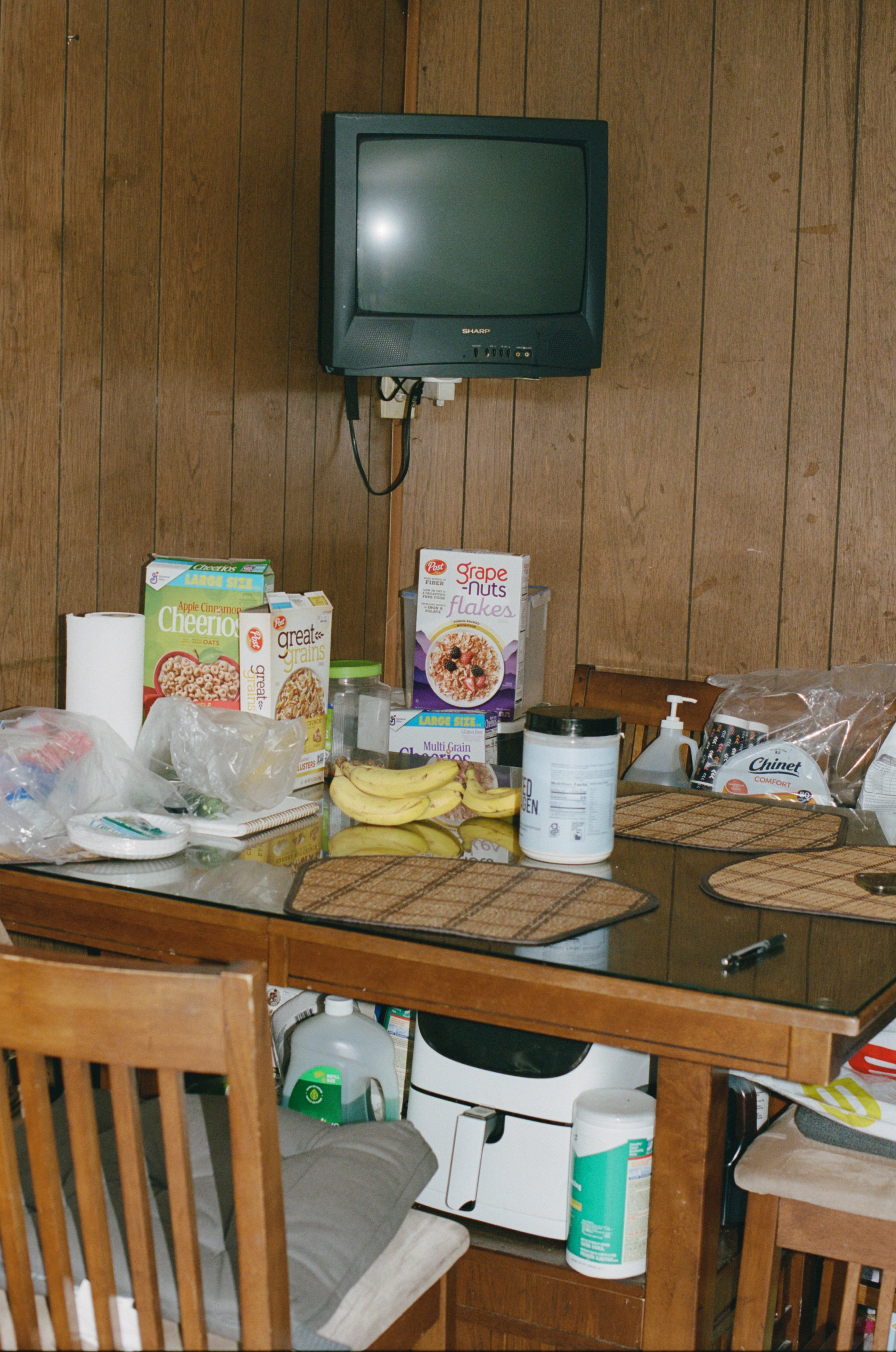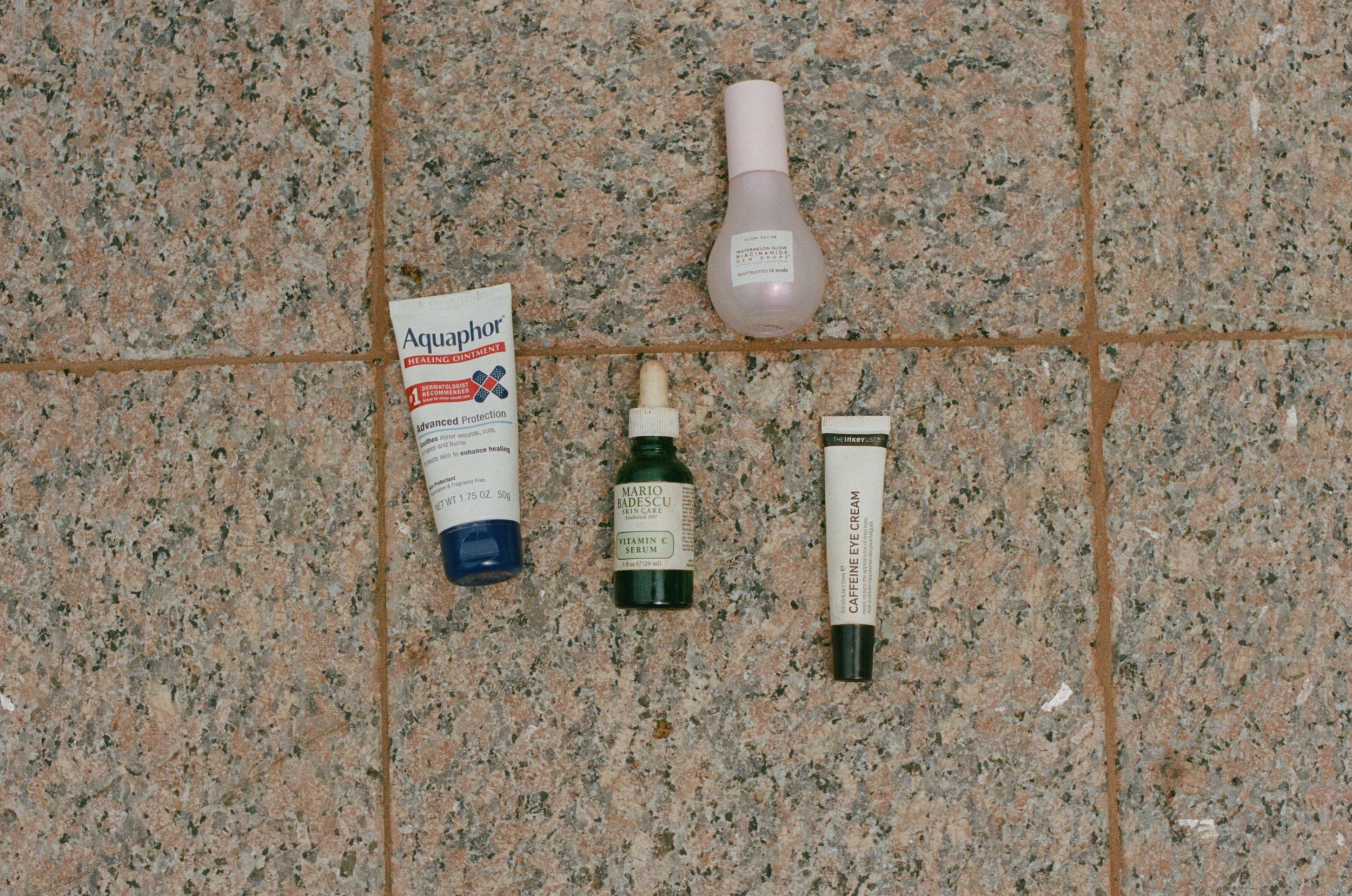Meet Danny Malave
Boxing coach Danny Malave is likely working if you spot her in Seaport, Manhattan, either holding mitts or helping a client through a tough maneuver. If not, she’s walking past the ferry, listening to Otis Redding or Tupac, not thinking about anything, just enjoying being in her body. We chatted with Danny about her unexpected path to fighting (she took a detour in musical theater that taught her a different kind of strength), her non-parent-approved tattoos, the importance of learning how to not get hit, being a constant for her clients, and much more.
♫ Listen to danny’s playlist | ⌨ danny’s last google search
on her morning routine
If I have a 6 a.m. client, I'm up at four. If it's seven, I'm up at five. There has to be a family routine, because my sister, my father, and I all wake up early for our jobs. I listen for my father to finish his shower, then I take mine, get dressed, listen to music as I put my makeup on, and read an excerpt from The Daily Stoic. On the train, I’m reading my book, drinking my coffee, or just looking out the window, watching to see who comes into the train. I read all these books about women who have these very strict routines, “I wake up in the morning at X time, I do my stretch, I do a meditation, I write in my journal,” and I've tried all that. I'll do it consistently for a month, but then I give up — it's just not me. I’m an on-the-go person. I do things with purpose. One morning consistency is that I always, always say “I love you” to either my mother or my father, whoever is in the house, and of course, I say “I love you” to my dog.
on her family’s new york
This is real Brooklyn. Everyone associates Williamsburg with Brooklyn, nothing against it, but it's not the full story. I grew up here, in Sheepshead Bay — no one knows where that is, so I tell people I live by Coney Island. I do live far away from the city, an hour, an hour and 15 minutes on the train. But this is my home, man, this is where my family is. Family has always been an important value for me. My dad always says “There are two circles. There's us, and then there's everyone else. As you get older, you're gonna make your own circle.” That's always something resonated with me — family first. Family can be whatever you want, my close friends are a part of my inner circle.
My dad comes from Spanish Harlem. He's the epitome of hard work. He didn't have a college degree, barely finished high school because he had to help his family financially, and then started working at Chase Bank. He started in a low level position and worked his way up far, all the way to a project manager. There was a point when he said to his superiors, “I don't know if I'm capable of this,” just education-wise — my father is a smart man, but he only had his GED. I remember my dad told me that his supervisor said to him, “Raymond, I'm gonna take care of you. Work hard, and stay focused. Don't let anyone deter you from what you want to do.”
on her beginnings in boxing
My dad got me into boxing. When I was younger, there were a lot of boys on the block, my sister and I used to hang out with all of them. We used to play rough — my dad saw that, and would say “You guys have to know how to defend yourselves.” He started boxing with us, playing around. Hector Camacho was a big fighter when my dad was younger, and we used to watch videos of him boxing. There were a lot of Puerto Rican fighters at the time. Sports were what kept you off the streets when my dad was young, so basketball, football, boxing, he did it all. My father saw early on that I was more of a tomboy, he had a big influence on my love of sports and athleticism.
“My mother is a strong woman, It took me becoming a personal trainer and being around strength all the time to really recognize that, because I was so rebellious. I learned from her later in my life that you’ve got to be assertive, and there’s nothing wrong with doing things passionately and with emotion. I embrace that now.”
on her love of performance
When I was young, my dad used to put music on, it’d be a song my whole family knew — my mom would sing it, and then I'd say “I can sing it better.” Her mother, my grandmother, liked to sing. My mom said my grandmother couldn't sing for shit, but she loved to do it, and my mother has a pretty decent voice. The shows that we used to watch when I was young were often sing-alongs, and I used to love that. All the little plays in grade school, I used to do them and get lead roles. For my 16th birthday, I didn’t want a “Sweet 16.” I said to my dad, “I want headshots.” I think that was more expensive than what the Sweet 16 would have cost, but he did it, and that kind of catapulted my ambitions into high school. Colors Of The Wind was the song I sang for my first ever audition in high school, for Sweeney Todd, and I got a role. I remember singing it to my dad, nonstop, for two weeks. Poor him. “Dad, does it sound good? What do you think? What do you think?” He coached me through the best he could, and I got the part.
My senior year, I was Charity in Sweet Charity. Audience members could write a little postcard to the actors, and this one from my dad says, “If I were to say how proud of you I am, I would still feel like that isn't enough. Love, your biggest fan.” And then from my mom, “Whatever you do brings a tear to my eye with how talented you are.” It's good thing I got the postcards after the show, ‘cause I would have been a mess before.
My parents liked that I did theater. It kept me focused throughout high school. I'm a big personality — it's probably because of theater. You’ve got to have some sense of fearlessness to be able to sit in front of people and ask, “Was I good?” and have someone say “No,” and then try again. That audacity, and tenacity, too. Theater got me a scholarship into college. I did well there, too — as a college freshman, I got a part in a show, which was a big deal. But then, I got carried away with partying, and I dropped out.
“I was good mover but I wasn’t a Triple Threat threat like that. One of the last auditions I ever did was for West Side Story, off Broadway. I had gotten through a lot of the auditions, and one of the dance routines included a double pirouette. I already knew. I got this far and because I couldn’t do that, I knew I wouldn’t get it — but who knows? I could have gone in there confidently and said “I’m gonna do it,” but I didn’t. I didn’t do the pirouette and I didn’t get the part, and that deterred me from pursuing performing. But that experience changed my mindset. I thought to myself, “I’m never again going to go into any situation thinking I can’t do it. I’m going to try. I’m going to show my potential.” I learned I’m a good learner. If I learn well, I will be able to do it. I might not be able to do it now, but I will be able to do it later.”
on her evolving relationship with her body
Around the time I dropped out, I got very, very skinny. I associated beauty with being really skinny. I used to chew and spit out my food. In my kitchen table, there's a little cabinet, and my sister looked in it once and saw all the crumpled-up napkins. I went to the beach with my best friend, we all were taking pictures and I looked at a picture of myself. I was shocked. I was like, “Is this me? This is how I look?” She was quiet, and I realized that something was wrong. Then, I was in the car with my father, and I said, “Dad, do I look bad?” He just looked at me and said, “Danielle, you don't look good. So you're gonna have to do something about it.”
I went and looked at meal plans, and saw this really buxom, in shape woman, and she was a competitive bikini model. I honestly started competitive bikini modeling because I knew it was going to force me to eat. I had to eat very specific things, it was annoying for my family, because we all lived and ate together. I also had to work out, and I liked that. I always knew I was a strong girl, but when I started working out with a lot of guys in the gym, they’d always emphasize, “You can hang with the guys. You’re strong.” I stopped with the competitive bikini modeling and started to go all-out with powerlifting. I loved the feeling of being a really strong woman, being able to squat over 200 pounds, deadlift 300 pounds, doing all this while I have two rods in my back from scoliosis. But when you're 20 years old, you think nothing's gonna happen to your body. Something did happen — I blew my back out, and that was it. So then I got back into boxing, but every time I had a fight, or was going to train for a fight, something happened, whether it was the pandemic or a problem with my health. I saw that as a cue from the higher powers, and I was like, “Maybe it shouldn't happen.” It was just this year that I really shifted into being a boxing coach, and I've never looked back. It was one of the best decisions I have ever made. I am really grateful for the people that I work with, who make me feel welcomed, because in general, boxing is still a boys’ club.
“Clients come first, their needs come first. It can’t be about what I think is good for them. It’s what do they think is good for them? If that aligns with what is healthy, and what I know I can help with, I’m going to do it. Nine times out of 10, these women come up to me and say ‘I want to be strong.’ I got you, girl. A lot of my clients have weddings and stuff, and they want to look cute and all. I’m like, ‘Sure, I got you too,’ but why don’t they want to be strong? They want to feel good about themselves, and that’s what will help! I love when my clients take pride in having muscles, when they’re like, ‘I could lift this, I can press 30, 40 pounds over my head. I can do pull-ups.’ I relish in that. It sounds selfish, but I love hearing that from my clients.”
on her first training gigs
After I dropped out of college, I tried to do pursue visual merchandising for athletic brands. I still liked to work out. A lot of my friends saw I was in pretty good shape for someone who would just casually go to the gym, and they’d be like, “Daniela, train me. I'll pay you.” I'd say, “I’m not gonna make you pay me.” Maybe 30 bucks, sometimes. Then, I was a front desk manager at a gym. You run into the trainers, and I would work out with them, but I wasn't a part of the community. They were all about community. Work out together, do this together, do that together. They wanted to do SoulCycle and I wanted to go lift my weights run. I wasn't going force myself to do anything. I wasn't a team player. I didn't play the game.
I applied for my first corporate training job, and coincidentally, I had worked for the woman who reached out to me, years ago, at a corporate gym, as a front desk associate. She personally emailed me, and said, “Daniela, when I saw your name, I had to reach out to you myself, when are you available to come in?” She didn't even interview me. She was just like, “You're on board.” The whole corporate thing was good for networking — a lot of the clients that I had five years ago, I still have now. The bad side of that kind of job is they try to sell it like you're gonna get a lot of benefits, but the benefits are contingent upon the hours you put in. If you want to go on vacation for a week, and you're not there for a certain amount of hours, they might take your healthcare away. Healthcare is a big thing in the fitness industry, because you're on your feet all day. It's very physically demanding and stressful, especially in the beginning, when you're trying to figure out what your craft is.
on her “physical education”
A good thing about working in a corporate gym was that they offered classes for trainers to learn and develop. When I went independent, I was on my own with my education. I had to read many books and apply for many certifications on the side, and all of that came out of my pocket. I have NCSF (National Council on Strength and Fitness), weight cut [the practice of fast weight loss before a sporting competition, usually to qualify for a lower weight class], and nutrition certifications. Right now, I'm studying for my athletic conditioning certification. I really love training athletes. It's so much fun, and there’s a lot of science behind it. After that, I think I might do an MMA certification. Nowadays, a lot of trainers are specifically disciplined in certain things. I'm gearing more toward nutrition, weight cutting, and athletic conditioning. I’m just working with boxers right now, but I would like to work with a powerlifter one day. That's an avenue I'd like to navigate — a female powerlifter, though. I have one client right now who’s really strong, and she explicitly said, “I have a powerlifting goal.” I'm excited to work with her on that.
“I’ve gotten into a few situations where I’ve had to defend myself. There’s nothing cowardly about running away. That’s another thing with boxing, it’s not a stupid person’s sport. You’ve got to be smart. It’s not just about how hard you can hit somebody, it’s ‘How am I not going to get hit? You’re not going to hit me. You’re not going to affect me.’ That’s something that carries through to the rest of my life: ‘You’re not going to hurt me, because I know how to respond. It might take me some time, but I’m going to be able to respond, and I’m going to become better.’ That’s something that boxing has instilled in me. I’m not going to touch the canvas and just stay down.”
on what makes a good coach
A good boxing coach feels what you're going through in the ring. All of the coaches I've had say it hurts to see someone get punched in the face. A good boxing coach takes responsibility for the boxer. People say boxing is the loneliest sport in the world, but your coaches are right there in your corner, 100%. They're gonna help you, because it's hard — long hours, a lot of discipline and sacrifice. Two clients I assist are great fighters, because they have jobs, but they make time to train, come in at 8:30, leave at 10, two sessions a day, sometimes. Hard work and dedication is really what it is, and, as corny as it sounds, rolling with the punches. Sometimes, you’ve got to take things on the chin, and you’ve got to say, “I'm gonna come back with my counter balance.” That's another big one, balance. It can be overwhelming sometimes, having your personal life, and also the life of being an athlete. The extent that these two clients are going for it…They're not getting paid for it, but it's more than a hobby — They're sacrificing so much time, they’re sacrificing their bodies, and they love it. You’ve gotta be a little crazy to do that. They inspire me to work harder.
on her tattoos
I was 16 when I got my first tattoo — I went with my two best friends. It's oak leaves, my father calls me “Danny Oak,” because oaks are some of the strongest trees. I'll never cover it up, as ugly as it might look. Up here, I have “Strong Warrior.” Not my favorite, but I'm not gonna get rid of it either. Do I really need words to remind me of what I should be? But…you know what? In moments when I might be not the strongest, I look down at my tattoo and I'm like, “All right, I got this.” I can't not be this. Gotta live up to what I have on my skin. The Matryoshka doll tattoo refers to my mother, matriarchy, female leadership.
One of my favorites is a bouquet, because it reminds me that I don’t need a guy to give me a bouquet of flowers. I have them already. The hummingbird is my mother's favorite bird. They say anything you get tattooed on your left side, you’re receiving. A hummingbird is a symbol of happiness, so I’m always receiving happiness. I have “Brooklyn” tattooed on the back of my neck because I'm a Brooklyn girl through and through, no matter where I go. This is one of my favorites — a butterfly, for Muhammad Ali's quote, “Float like a butterfly, sting like a bee.” My family's not too happy with my tattoos, but I am who I am.
on her beauty routine and personal style
In the morning, I put on my eye cream, because at 32, it's a whole different ball game. I like this Watermelon Glow Cream from Sephora, it's such a good moisturizer. I also use these Niacinamide Dew Drops by Glow Recipe, Aquaphor Healing Ointment, Mario Badescu Vitamin C Serum, and The Inkey List’s Caffeine Eye Cream. After I work out, I take another shower, I use my makeup removers and all that because I want to be clean for the rest of the day. I really try to take good care of my hair. I have very curly hair, believe it or not, but I wanted to do it straight today. I use Shea Moisture conditioners in my hair, they smell so good. I do a wet comb while I'm in the shower so the curls come out nice. On Friday nights, I go to my best friend's house, and we do skincare. She loves the Fenty Beauty masks right now, so we do those.
I have a lot of clothes from Nike and Alo Yoga. Those are my big go-tos for athleisure. I was doing it way before it was popular! I had a lot of cool t-shirts and sweats as a kid. I'd like to say I was ahead of the trend before it became a thing. Zara is another store I frequent. I love dresses. When I go out, I love to wear a nice tight black dress. It’s simple and classy. Heels are little more challenging to put on for me, but I do do it sometimes. I like a mix of masculinity and femininity. I think it's beautiful. Why not combine the two? There’s strength in beauty, beauty in strength.
danny’s favorite spots in nyc
If you're in Brooklyn, you have to go to Di Fara or Delmar in Sheepshead Bay for pizza.
interview and images by clémence polès, edited by em seely-katz

